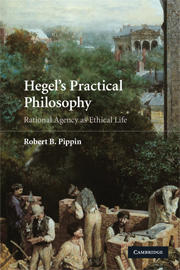4 - The actualization of freedom
Published online by Cambridge University Press: 05 June 2012
Summary
The discussion in chapter 3 introduced Hegel's distinctive claim that philosophy must concern itself with the “actuality” of the concepts with which it deals, a differentiation something like Rawls' distinction between a concept and a conceptualization. Hegel introduces with such a notion a distinction between an idealized or utopian (and thereby practically distorting and possibly naïve) notion of a free life, and what appears to be an insistence on a realistic account of what a free life, or a life of one's own, could be for the organic, striving, socially organized, mortal historical beings we are. There are well-known objections to this dimension of Hegel's thought. Although he regularly characterizes his practical philosophy (indeed, his philosophy as a whole) as a philosophy of freedom, and although Hegel frequently makes crystal clear that he considers himself a resolute defender of modernity, his practical philosophy has nevertheless been shadowed by two disturbing accusations of illiberal, even reactionary elements, and they both have to do with this actuality condition. The first is the charge of anti-individualism, as if Hegel was insufficiently attentive to the modern claims of individual natural right and indeed supposedly believed that individuals themselves were best understood within a metaphysical theory of actuality, that they were according to such a theory mere properties, or as contingent, secondary, ultimately unimportant manifestations of what is truly “actual,” which is a supra-individual ethical substance (as if individuals were not fully real or actual).
- Type
- Chapter
- Information
- Hegel's Practical PhilosophyRational Agency as Ethical Life, pp. 92 - 118Publisher: Cambridge University PressPrint publication year: 2008



